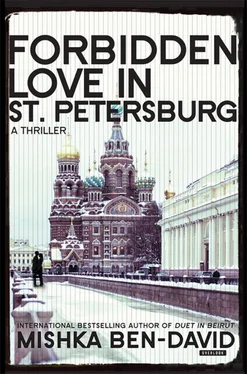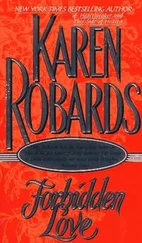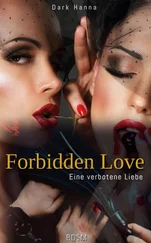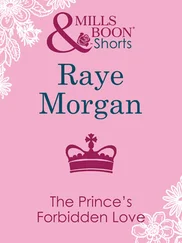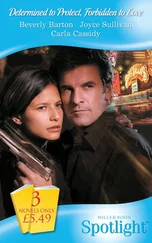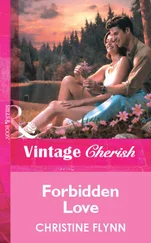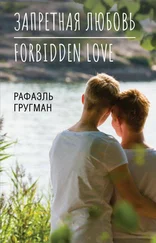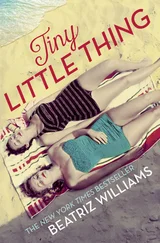Eight fifteen it is. But only on condition that you allow me to pay for the ticket.
Her face fell. Why bring money into it?
OK, we’ll talk about it some other time.
We’ll see each other there, she said, the look of happiness restored to her beautiful eyes.
The Mariinsky Theatre has four huge white columns straddling its green façade, while on either side of it other, non-symmetrical buildings in the same colours looked as if they had been glued on to it. Anna waited next to a doorman at the entrance to the building, tickets in hand, and as soon as I saw her I realized that I wasn’t appropriately dressed for the occasion. She was wearing silk gloves, a white fur coat, white leather fashion boots, and her make-up gave her eyes an even more elongated and beautiful look. I was wearing a simple suit, an ordinary tie, and a dark raincoat. From a brief glance I could see that the men and women around me had all come in evening clothes.
Realizing that a regular handshake would be a bit phony, I reached out to her with both hands as if intending to clutch both of hers. She placed her satiny hands in my open palms, then sidled up to me and kissed me on both cheeks. Her scent enveloped me and made me feel a bit dizzy. I felt that the brush of her lips on my cheeks, however formal it might have been, was a step forward in the possibly imaginary relations with her that I had conjured in my mind.
Anna, acting quite naturally, slipped her arm into mine and led us into the theatre’s foyer. Surprisingly, both the entrance and the lobby were modest, lacking any decoration.
We have time for coffee if you would like to drink real coffee, she said, a hint that she had noticed the face I’d pulled when drinking Vashkirova’s brew.
Not made from potatoes this time? I asked and she giggled charmingly.
Whatever variety you might desire. From Jacobs to Blue Mountain to St Helena and Segafredo. Sorry that I’m not an expert, there are certainly other kinds I’ve never even heard of.
I’m also not a connoisseur when it comes to taste, not of foods, or wines or coffee, I hurried to cover her embarrassment, which quite possibly wasn’t embarrassment at all but rather a slightly ironic remark about those for whom the quality of coffee is an important consideration.
The aroma of the fine coffee mingled with the fragrance of her hair and her alluring perfume as we stood at a raised round table sipping our drinks, I my coffee and she her Belgian hot chocolate. By the looks of it she didn’t keep an especially strict diet contrary to what I’d assumed on the basis of the portions of soup I’d seen her eating.
You had a good day at the office? Anna asked.
Normal day, emails, quotations, tenders.
As it happens I’d been engaged for a few hours in a coded correspondence with HQ after they’d sent me an impossible set of instructions for the gathering of intelligence about Tajikistan. They had asked for reports on security agencies and security arrangements at the airport–controlled by senior Iranian personnel–in the sort of detail which I didn’t think I could provide after a short business trip.
And how was your day? I asked, trying to quickly divert attention away from my activities.
Very few buyers, she said. I spent most of the time searching for some old books that a few of my regular customers are looking for, including first editions that are no longer available on the open market.
I must come and visit you there, I said, and immediately regretted it, guessing what would come next:
And I’ll visit you sometime too.
If you’re interested in seeing a boring office, I said, trying to put her off the idea.
Would you like to go over the program? she asked and to my great relief let go of that troublesome topic.
The first work was to be the piano concerto in B flat minor. Anna told me that this was a fairly rare performance of it. Even though in the past it had been thought of as a perfect piece of musical writing, she explained–in fact the first of Tchaikovsky’s compositions to be received as such–it is nowadays considered over-sentimental, and is almost never played.
We went into the concert hall at the sound of the first bell and there the real magnificence of the place became apparent: tier upon tier of boxes, their fronts inlaid with gilded wood and in the middle a large ornate box bedecked with gold engravings dating back to the days of the Czars. The splendid curtain also remained hanging as it had done at the time of the Czar and everywhere around there was an almost unimaginable wealth of dazzling baroque.
When, after a short while, we settled into our seats, the woman to Anna’s right turned to her, expressed her condolences, and glanced at me briefly. It occurred to me that, for season-ticket holders, the seats and the neighbours are usually the same, and that it was obviously uncomfortable for her to be seen with another man. But when the conductor and pianist entered, the audience greeted them with loud applause. Anna looked straight ahead at the stage, and the conductor signalled to the pianist and the orchestra to launch themselves into the concerto. I couldn’t help but feel exhilarated by this romantic and passionate music. Perhaps, being next to Anna, this is what I was bound to feel, our elbows sharing the same armrest, touching each other. But Anna was not swept away, not by the gushing music, as she described it, nor by the rub of my elbow.
My musical knowledge was limited–guitar lessons, music lessons at school and listening to the radio station, The Voice of Music, during the long hours driving from the Arava or Jerusalem to Glilot, the Mossad’s HQ near Tel Aviv. Back then I did very much like Tchaikovsky, particularly as it happens, because of that romantic and harmonious lightness.
When the orchestra began to play the Fourth Symphony I could see that Anna was trembling. I noticed this during the first movement which, as she told me, describes abortive attempts at fleeing from tragic reality into the world of dreams, as well as in the second which deals with escaping into the past. It was only when she whispered this, whilst I was having trouble connecting the ‘composer’s intent’ with the arabesques I was hearing, that I became aware again of the fact that next to me was a woman wronged by fate, a woman who had lost her husband only a few months earlier.
During the interval we sat at a table in the foyer, and Anna happily ate a salmon sandwich. All I wanted was another cup of coffee. When I asked how she knew so much about music she told me that at one time she’d been a student at the St Petersburg Conservatoire where Tchaikovsky had studied a hundred and twenty years earlier, though in his time it had been in a different place. She also said she knew every one of his works and was familiar with practically every chapter of his life. Did you know that the new Conservatoire is right here, it’s that brownish-grey building across the street. I spent some wonderful years there and I love it very much.
You play? Compose? I asked
I used to play the piano and also compose, but that was years ago, Anna replied, her eyes lowered. Now my connection to music is through concerts and what I listen to all day long in my shop.
Did you ever think of becoming a musician?
I thought of becoming a composer or a pianist, but when I realized that neither of these was going to materialize I went to university to study at the Institute for Russian Literature at Pushkin House because I wanted to be a poet and a translator as well. Now I am a bookseller and have a subscription to the Philharmonic. What’s left are the memories of dreams, she said sadly, then asked me to excuse her for what she’d said.
No, no, I said, placing my hand on her palm, it’s really OK. I want to hear about it.
Читать дальше
